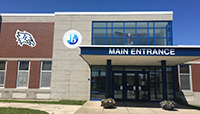7516 - Student Health Services
| Policy: Student Health Services | Policy Number: 7516 |
| Date of Original Policy: 12/09/2015 | Date Revision Adopted: 01/19/2022 |
| Reviewed by Policy Committee: 10/17/2018 | Date of Next Review: 12/09/2024 |
| Replacement of Policy Number: 7511, 7512, 7513, 7514, 7520 |
The Board of Education recognizes that good student health is vital to successful learning and acknowledges its responsibility, along with that of parent(s) or guardian(s), to protect and foster a safe and healthful environment for the students.
The school shall work closely with students' families to provide detection and preventive health services. In accordance with law, the school will provide vision, hearing, dental inspection and scoliosis screening. Problems shall be referred to the parent(s) or guardian(s) who shall be encouraged to have their family physician/dentist provide appropriate care.
In order to enroll in school a student must submit a health certificate within 30 calendar days after entering school, and upon entering second, fourth, seventh and tenth grades. The examination, which must conform to state requirements, must have been conducted no more than 12 months before the first day of the school year in question. If a student is unable to furnish the health certificate, the school will provide a physical examination by a licensed provider. A request for exemption from the physical examination, or the requirement to provide a health certificate, must be made in writing to the school principal or designee, who may require documents supporting the request. The only basis for exemption is a claim that the physical examination is in conflict with the parent or guardian’s genuine and sincere religious belief.
The Board recognizes that the State of New York may authorize and require the collection of data from health certificates in furtherance of tracking and understanding health care issues that affect children. The Board supports these efforts and expects administrators to cooperate and to observe the appropriate laws and regulations in carrying out those responsibilities, including those that relate to student privacy.
In addition, students will be asked to provide a dental health certificate when they enroll in school and in accordance with the same schedule as the health certificate.
A permanent student health record shall be part of a student's cumulative school record and should follow the student from grade to grade and school to school along with his/her academic record. This record folder shall be maintained by the school nurse.
Schools shall also provide emergency care for students in accidental or unexpected medical situations. Each school in the District will include in its emergency plan a protocol for responding to health care emergencies, including, but not limited to, anaphylaxis and head injury. Parents/guardians will be notified of any emergency medical situation as soon as is practical.
Communicable Diseases
It is the responsibility of the Board to provide all students with a safe and healthy school environment. To meet this responsibility, it is sometimes necessary to exclude students with contagious and infectious diseases, as defined in the Public Health Law, from attendance in school.
It is the responsibility of the Superintendent of Schools, working through district health personnel, to enforce this policy and to contact the county or local health department when a reportable case of a communicable disease is identified in the student or staff population.
Administering Medication to Students
Neither the Board nor district staff members shall be responsible for the diagnosis or treatment of student illness. The administration of prescribed medication to a student during school hours shall be permitted only when failure to take such medicine would jeopardize the health of the student, or the student would not be able to attend school if the medicine were not made available to him/her during school hours, or where it is done pursuant to law requiring accommodation to a student's special medical needs (e.g., Section 504 of the Rehabilitation Act of 1973). "Medication" will include all medicines prescribed by a physician.
Before any medication may be administered to or by any student during school hours, the Board requires:
1. the written request of the parent(s) or guardian(s), which shall give permission for such administration and relieve the Board and its employees of liability for administration of medication; and
2. the written order of the prescribing physician, which will include the purpose of the medication, the dosage, the time at which or the special circumstances under which medication shall be administered, the period for which medication is prescribed, and the possible side effects of the medication.
Students are allowed to carry and apply parentally provided sunscreen without a prescription from a medical provider, assuming that the sunscreen is FDA approved and that the sunscreen is not treating a medical condition. Parents need to provide the District with written permission for students to use sunscreen.
Permission slips and medical orders shall be kept on file in the office of the school nurse.
In addition, in accordance with Education Law 919, the District shall make a nebulizer available on-site in school buildings where nursing services are provided. Students with a patient-specific order, who require inhaled medications, shall have access to the nebulizer. The District will ensure that it is maintained in working order.
In conjunction with the nebulizer, the school stocks Albuterol in the form of metered dose inhalers for students who are in need of emergency dosing when their personal prescription is empty. The District will develop procedures in collaboration with school health personnel that is approved by the District medical director and the Board of Education.
Life-Threatening Allergies and Anaphylaxis Management
The Board recognizes its role and responsibility in supporting a healthy learning environment for all students, including those who have, or develop, life-threatening allergies. The District will work cooperatively with the student, their parent/guardian and healthcare provider to allow the child to participate as fully and as safely as possible in school activities. When a student has a known life-threatening allergy reported on their health form or if the District has been informed by the parent of the presence of a life-threatening allergy, the District will assemble a team, which may include the parent, the school nurse, the child’s teacher, the building principal and other appropriate personnel, which will be charged with developing an individual health care plan. The plan will be maintained by the school nurse. The plan will guide prevention and response. If the student is eligible for accommodations based upon the IDEA, Section 504 or the Americans with Disabilities Act, the appropriate procedures will be followed regarding identification, evaluation and implementation of accommodations.
Training
Training to support the fulfillment of staff responsibilities in regard to student health services will be provided as part of the District’s ongoing professional development plan and in conformity with Commissioner’s regulations.
Regulations
The Superintendent shall develop comprehensive regulations governing student health services. Those regulations shall include the provision of all health services required by law, procedures for the maintenance of health records, and procedures for the administering of medication to students. The Superintendent shall also develop protocols, in consultation with the school physician and other appropriate district staff, for the management of injury, with particular attention to concussion.
Education Law §§310 (provisions for appeal of child denied school entrance for failure to comply with immunization requirements); 901 et seq. (medical, dental and health services, BMI reporting); 919 (provide and maintain nebulizers); 6909 (emergency treatment of anaphylaxis)
Public Health Law §§613 (annual survey); 2164 (immunization requirements)
8 NYCRR § 64.7 (administration of agents to treat anaphylaxis); § 135.4 (Physical Education); Part 136 (school health services program)
Administration of Medication in the School Setting Guidelines, State Education Department, revised April 2002
Immunization Guidelines: Vaccine Preventable Communicable Disease Control, State Education Department, revised August 2000
Making the Difference: Caring for Students with Life-Threatening Allergies, New York State Department of Health, New York State Education Department, New York Statewide School Health Service Center, June 2008
Concussion Management Guidelines and Procedures, www.nysphsaa.org




